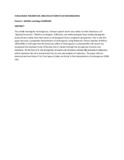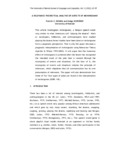| dc.contributor.author | Kihara, Patrick C | |
| dc.contributor.author | Schroder, Helga | |
| dc.date.accessioned | 2014-12-09T12:25:34Z | |
| dc.date.available | 2014-12-09T12:25:34Z | |
| dc.date.issued | 2012 | |
| dc.identifier.citation | The University of Nairobi Journal of Language and Linguistics, Vol. 2 (2012), 63-78 | en_US |
| dc.identifier.uri | http://hdl.handle.net/11295/76905 | |
| dc.identifier.uri | https://linguistics.uonbi.ac.ke/basic-page/university-nairobi-journal-linguistics-and-languages | |
| dc.description.abstract | This article investigates mchongoano, a Kenyan speech event
very similar to what Americans call “playing the dozens”. Much
as sociologists, folklorists, and anthropologists have studied
playing the dozens fewer studies have been done on mchongoano
from a pragmatic perspective. That is why this paper discusses a
pragmatic interpretation of mchongoano using Relevance Theory
(Sperber & Wilson 1995/2004). It will argue that the humorous
effect of mchongoano is achieved after the hearer has recognised
the intended insult of the joke that is created through the
incongruity of events and situations. On the face of it, the
incongruity of events and situations violates the principle of
relevance, which stipulates that all communication has its own
presumption of relevance. The paper will also demonstrate how
three of Yus’ four types of jokes are found in the interpretation
of mchongoano (2008: 142) | en_US |
| dc.language.iso | en | en_US |
| dc.publisher | University of Nairobi | en_US |
| dc.subject | University of Nairobi Journal of Linguistics and Languages | |
| dc.title | A relevance-theoretical analysis of aspects of Mchongoano | en_US |
| dc.type | Thesis | en_US |
| dc.type.material | en_US | en_US |


